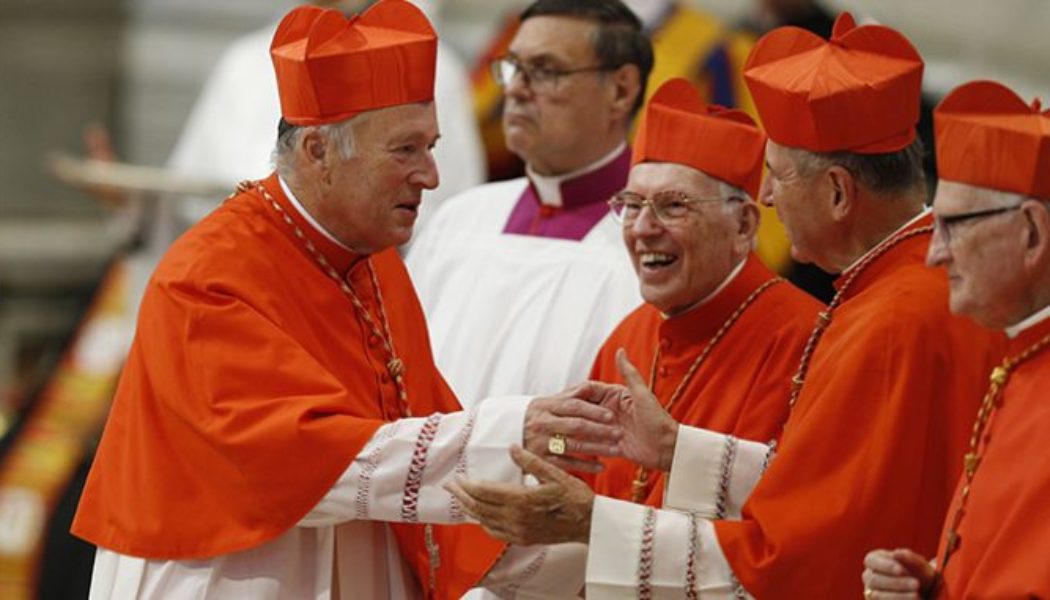
In his recent response to “critics on sexual sin, the Eucharist, and LGBT and divorced/remarried Catholics” Cardinal Robert W. McElroy defends the morality of some instances of sex between LGBT and divorced and remarried Catholics.
I reply here to four problems with his defense: it proposes 1) a misleading conception of conscience; 2) a misrepresentation of the history and content of the Catholic Church’s absolute condemnation of all non-marital sexual acts; 3) a misunderstanding of the relationship between the doctrinal and the pastoral realms; and 4) a non-Christian understanding of conversion, accompaniment, and discipleship
Conscience
McElroy says, “it is conscience to which we have the ultimate responsibility and by which we will be judged.” He goes on to conclude: “For that reason, while Catholic teaching has an essential role in moral decision-making, it is conscience that has the privileged place.”
This warrants careful consideration. Conscience in the relevant sense is one’s last and best judgment about the morality of a particular act. One is always obliged to follow one’s conscience judgment, since the alternative is to do what one judges to be morally wrong to do, or to fail to do what one is morally obliged to do. The obligation to follow conscience remains even when one’s judgment about what morality requires is erroneous, for one is obviously not in a position to know that one’s last and best judgment about the morality of a particular act is erroneous. Thus, inasmuch as we are always morally obliged to follow conscience, McElroy is correct that it is to conscience that we have the ultimate responsibility.
It is essential to bear in mind, however, that one’s erroneous judgment of conscience can be either blameless or blameworthy. If a person is not responsible for the error, then even though what the person does in following conscience is objectively wrong, he incurs no guilt; he has a blameless erroneous conscience. For example, parents may sincerely but wrongly judge that God wants them to disallow a blood transfusion without which their child will die. If they honestly tried to form their consciences properly, they are guiltless in following conscience despite its error.
But the point of morality is not just to follow conscience, but to arrive at and follow a true judgment of conscience lest damage be done to human goods and human persons. Although a person with a blameless erroneous conscience incurs no guilt for the objective evil he does in following conscience, that is cold comfort to those who are harmed by the choices made under the influence of the erroneous conscience. The parents who refused to authorize the transfusion may be blameless, but their child will be no less dead.
Morality, then, is about doing what one can to reach and follow a true conscience judgment.
The point does not apply only to obvious cases like the one just mentioned, but to the cases of sexual morality with which Cardinal McElroy is concerned. Adultery (i.e., sexual acts between the divorced and civilly remarried) and sexual acts between same-sex partners—and indeed, all non-marital sexual activity—are morally wrong not because God arbitrarily says so. Rather, God forbids such acts because they are at odds with the good of marriage and the good of the persons affected by choices to engage in those acts. For that reason, true concern for the welfare of people tempted to engage in non-marital sexual activity should move us to want help them live chastely even if we could know that they were not culpable for such acts.
But we have no window into the consciences of other people. Although in some cases we may have strong reasons for thinking that people are unlikely to be culpable for such acts—just as in other cases we may have strong reasons for thinking people are blameworthy—we have no way of being certain of where they stand morally. We cannot know and should not make assumptions about their guilt or innocence. Most Christians seem to grasp the importance of not assuming that others are guilty of sin, but it is less clear that most realize what a terrible mistake it is—indeed, what a gross failure in pastoral charity it is—to assume that those who do what the Church teaches to be gravely wrong are not culpable. For unless we know what we cannot know—i.e., that they are inculpable—we cannot exclude the possibility that they are culpable, in which case they have placed their souls in grave danger. The worst pastoral response in such a case is for a pastoral minister to fail to warn them. Indeed, such a failure is disastrous for both the one entrusted to the minister and the minister himself, as Ez. 33:1–9 makes strikingly clear.
Cardinal McElroy’s statements that we will be judged by conscience, and that conscience, rather than Church teaching, has the privileged place in moral decision making, must be evaluated in light of the truth that a person with a blameworthy erroneous conscience—whose conscience is in error, but the error is his own fault—will be culpable for whatever objective evil it leads him to do, despite the fact that the person remains morally obliged to follow conscience. The Cardinal’s statements misleadingly suggest that those who follow their conscience are inevitably, by virtue of doing so, morally justified. That suggestion is dangerously false in the case of a person who is at fault for having an ill-formed conscience. As Gaudium et spes, 16, teaches: “Conscience frequently errs from invincible ignorance without losing its dignity. The same cannot be said when someone cares but little for truth and goodness, and conscience by degrees grows practically sightless as a result of a practice of sinning.”
We are not judged by conscience detached from truth; rather, we are judged by truth and our sincere efforts to live by it. Insofar as one is not morally justified by following a culpably ill-formed conscience, it does not have the privileged place in moral decision making. Rather, in this respect it is truth, which is discoverable by the proper exercise of reason and humble recourse to Church teaching, that holds the privileged place in moral decision making by enabling one to come to an objectively true judgment of conscience.
Finally, astute pastors know the serious temptation that all experience to rationalization and self-deception, and the tendency for those habituated to certain sins, especially sexual sins, to wrongfully tolerate their sin, when in truth what is necessary is a salutary effort of will. It would be pastorally perilous to conclude that because “under certain circumstances people find it very difficult to act differently” (Amoris Laetitia, 302), that they are thus inculpable for their behaviors. The presumption should be that if a person knows the Church teaches that a kind of chosen behavior is gravely immoral, and he continues to choose that behavior, that he should sacramentally confess every instance of that behavior and leave the question of the certainty of culpability to divine judgment.
Catholic moral teaching’s absolute condemnation of all non-marital sexual acts
McElroy is quite bothered by the Catholic teaching that all freely chosen non-marital sex acts are gravely sinful. He deplores the fact that the Church condemns every freely chosen contraceptive act, while other worse acts, he claims, are not considered objective mortal sins:
It is automatically an objective mortal sin for a husband and wife to engage in a single act of sexual intercourse utilizing artificial contraception…[But] it is not automatically an objective mortal sin to physically or psychologically abuse your spouse. It is not automatically an objective mortal sin to exploit your employees. It is not automatically an objective mortal sin to discriminate against a person because of her gender or ethnicity or religion. It is not automatically an objective mortal sin to abandon your children.
To vindicate his charge that the Church is unreasonable in teaching that non-marital sex acts are always grave matter, McElroy packs as much gravity as possible into his list of acts that he says are not always grave matter. As a result, some of his claims are simply false. When mistreating one’s spouse is light matter, it is not called abuse, and when leaving one’s children is justified, the object of one’s choice is not abandonment. Truly abusing one’s spouse and abandoning one’s children are gravely contrary to the virtue of justice. Ironically, far from showing that the Church’s teaching that non-marital sexual acts are not always grave matter is unreasonable, McElroy’s list raises the question of whether the Church should not teach that other acts, properly defined, also are always grave. Exploitation and discrimination, if serious, are also gravely contrary to justice. I say “if serious”, because some of what may be considered exploitation and discrimination are not serious offenses against human good. If I gruffly ask my administrative assistant to get me a cup of coffee each morning, she might feel this is exploitative; and if I choose to yoke myself in trusted friendship only to other committed Christians, this is a kind of discrimination; but neither is seriously harmful to human goods.
But Catholic moral tradition has judged that intentional sexual acts always are gravely related to and impactful on human goods. And thus that every freely chosen sex act is morally serious; that it admits of no parvity of matter; that there is never a little bit of adultery or a minor act of sodomy; that if chosen freely and with sufficient reflection, non-marital sex is always mortally sinful (i.e., ex toto genere suo).
The Cardinal claims this moral judgement is a novelty of the 17th century:
For most of the history of the church, various gradations of objective wrong in the evaluation of sexual sins were present in the life of the church. But in the 17th century, with the inclusion in Catholic teaching of the declaration that for all sexual sins there is no parvity of matter (i.e., no circumstances can mitigate the grave evil of a sexual sin), we relegated the sins of sexuality to an ambit in which no other broad type of sin is so absolutely categorized.
The Cardinal’s claims are utterly false. There certainly are sexual sins that are objectively venial, as is clear from Aquinas (IV Sent., d. 31, q. 2, a. 2, ad 2; ST, Supp. q. 49, a. 5c). And although McElroy correctly reports the judgment that freely chosen sex acts that are non-marital in kind admit of no parvity of matter, this judgement is by no means novel to the 17th century. The great Jesuit moral theologian, Henry Davis, S.J., wrote in 1935 that the historical evidence in support of this Church teaching is so compelling that no theologian would venture to deny it (Moral and Pastoral Theology, v. 2, pp. 180-181).
Expounding the teaching in, for example, De Malo, q. 15, a. 2c and ad 18, Aquinas makes clear that it stems from saintly reflection not only on what is said about sex in Galatians 5:19, 21, Ephesians 5:3-4 and Matthew 5:28 and on the fact that sex in its integrity is the matter of a sacrament, but also on the reality that willing to engage in any of the varieties of non-marital sex is incompatible with the integral respect for marriage that is needed for the wellbeing, temporal and eternal, of new persons.
Yes, the 17th century saw the first of a series of statements of the Holy Office on the question, but they looked back to statements by Popes in 1054 and 1254, and addressed the doubts of a few theologians about supposedly borderline cases such as solicitation, or seeking sexual pleasure from a socially accepted public kiss. By mid-17th century there was no longer any theological support for the idea that maybe some marginal kinds of chosen non-marital sex admit of parvity of matter (see John Connery, S.J., The Morality of Incomplete Venereal Pleasure, dissertation, Rome:1948, pp. 276-278).
But McElroy’s wider project is not to address marginal cases, but as stated to defend instances of full-on sex acts between LGBT or divorced and “remarried” or other unmarried Catholics. He ignores the very ample Scriptural witness, which tells against his position: on adultery, Mk.10:2-12: “if she divorces her husband and marries another, she commits adultery” (see also Matt. 19:3-9, Lk. 16:18, 1 Cor. 6:9-10, 7:10-11); for sodomy, Rom. 1:26-32: “though they know God’s decree that those who do such things deserve to die, they not only do them but approve those who practice them”; and again 1 Cor. 6:9-10: men “having sex with men … will not inherit the kingdom of God.”
Jesus’s condemnation of divorce and attempted remarriage as adulterous is infallibly affirmed by the Catholic Church at Trent when the Council defines sacramental marriage, even in cases of adultery, as absolutely indissoluble (Canons on the Sacrament of Marriage, nos. 7 & 5). The Gospels do not report Jesus condemning sodomy explicitly, because he was addressing Jews in Palestine who knew that the Old Testament treats it as worthy of death (Lev. 20:13; “an abomination” before the Lord: Lev. 18:22-30; etc.). Only when St. Paul was dealing with Gentiles who practiced homosexuality was its contrariety to natural law/reason and to God’s prohibition expressly restated in the New Testament. Trent infallibly defined this prohibition when the Council includes “fornicators, adulterers [and], sodomites” among those “who commit mortal sins and … separate them from the grace of Christ” (Denz. 1544, 1577).
In a statement that seems to express an animosity towards the Church’s settled, apostolic teaching on sex, the Cardinal claims:
The moral tradition that all sexual sins are grave matter springs from an abstract, deductivist and truncated notion of the Christian moral life that yields a definition of sin jarringly inconsistent with the larger universe of Catholic moral teaching.
This too is false. The Catholic contextual “universe” for the Church’s ancient, apostolic judgment on sexual sins is not 17th century deductivist rationalism, but rather the important human and Christian values at stake in willed sexual acts. In 1975, the Congregation for the Doctrine of the Faith wrote: “sexual morality encompasses such important human values that every violation of it is objectively grave” (Persona Humana, 10). The Church has soberly asked what is required for the upholding and flourishing of the good of marital friendship, a good that Christianity and Judaism have always known to be especially vulnerable; which even receives two divinely revealed precepts in the Decalogue directed towards preserving its integrity in every human will (Ex. 20:14, 17).
“The whole Catholic Church,” Germain Grisez writes, “all the faithful, from the bishops to the least of the laity, held [until very recently] the same sexual morality”; this is because the Church, morally measuring every sex act according to whether anyone choosing to engage in it has a will integral/consistent with monogamous, faithful and fruitful marriage, has concluded that every chosen non-marital sex act is harmful and so immoral; “although the Church has not solemnly defined the teaching … that teaching has been infallibly taught [because it] meets the conditions which Vatican II articulated for the infallibility of the ordinary magisterium” (Living a Christian Life, ch.9, E, 6).
Pastoral vs. Doctrinal
In his final paragraph, the Cardinal claims that those who oppose “the pastoral mission of Pope Francis” place an undue emphasis on the doctrinal to the neglect of the pastoral. He insists that “the pastoral cannot be eclipsed by doctrine”.
This assertion also deserves careful consideration. Doctrine (Lat.— doctrina) simply means teaching. With respect to the two teachings at hand—on adultery and homosexual acts—the doctrines are grounded in divine revelation and so are definitive, settled, non-negotiable, infallible. This definitive nature derives chiefly from the witness of Sacred Scripture, as we have seen, but also from the writings of fathers and doctors of the Church, the teachings of popes and bishops, the example of the saints, and the doctrines handed on in catechisms and approved manuals for centuries.
The Cardinal says this teaching cannot eclipse pastoral practice, but the pastoral mission of the Church is to shepherd the flock of God according to the will of Christ. When Scripture and Church teaching set forward a definitive moral judgement, they are setting forth the will of Christ for human behavior. They are doing something eminently pastoral; they are guiding behavior, inviting disciples to avoid actions that set them out of communion with Christ by departing from his will. Is the Cardinal saying that the will of Christ must never eclipse the task of shepherding persons according to the will of Christ?
His complaint only makes sense if he doesn’t think that adultery and homosexual acts are intrinsically evil. He doesn’t say this outright because he has the weight of infallible moral teaching opposing him, and such assertions will be seen for what they are: denial of divine and Catholic truths. But if he accepts the teachings, then, as a shepherd of the Church, he cannot but reply: avoid these sins; if you don’t, then repent; if you don’t repent, you presumptively set yourself outside the friendship of Jesus and so outside communion with his Church.
Christian conversion, pastoral accompaniment and discipleship
McElroy wants a conception of Christian conversion that does not require as a condition for its fulfillment repentance and a firm purpose of amendment. He repeats the phrase that the pastoral theology of Pope Francis privileges the “concrete reality of human life”. He obviously thinks that homosexual sex and sex with someone other than one’s valid spouse, even when freely chosen with sufficient reflection, are, because of people’s concrete realities, at least sometimes consistent with communion with Christ.
He continues saying the circumstances of such people are “enormously complex”. The statement in context clearly means that pastoral accompaniment does not require repentance here and now, and that “mercy” tolerates marital infidelity and homosexual promiscuity.
This conclusion is not new. It has been the major premise of doctrinal dissenters for well over fifty years: large numbers of baptized Catholics struggle with sexual sin; therefore, we ought not to consider these unrepented sins as incompatible with full communion with Christ and his Church.
But although the experience of the divorced and civilly remarried and those with same-sex attraction may be complex, the moral status of sexual activity outside of marriage is not. Freely chosen sex acts are, like all free choices, subject to a person’s agency and can either be resisted or engaged in. When they are engaged in, unless addiction is present, a person knows what he is doing and can do otherwise. Though mastering one’s urges and ordering one’s relationships may be extremely difficult, with grace–which God never fails to offer—one can do both.
Therefore, also at the heart of the Catholic moral “universe” is the biblical admonition that grace is sufficient, indeed is perfected in weakness (cf. 2 Cor. 12.9). When one yields to grave sexual temptation, he violates his body’s capacity for self-giving and the sacramental significance of human sexuality; he morally mutilates himself, weakens his will, harms his children, and entangles himself in disordered committed relationships, all making himself less apt to reverence the good of monogamous, faithful, and fruitful marriage. And, if he knows Catholic truth, he also alienates himself from Christ and his Church. The Cardinal—and his coreligionists such as James Martin, S.J.—don’t seem to believe that every act of adultery and every choice for homosexual sex is bad for people, harmful, and impactful on salvation, and that justifying such acts, even given complex situations, is therefore never merciful or loving.
The Cardinal says he’s emulating Jesus’s example: “First, the Lord embraces the person, then he heals them. Then he calls the person to reform”—three apparent moments of “encounter” with Christ. And “their order,” he says, is “essential”: merciful love, then healing, then call to repentance, as if these were three phenomena stretched out in time.
But this really is not Jesus’ example. Christ did not say: accept God’s love, remain in that love, and repent/convert later. It is true that Jesus sometimes says, “Your sins are forgiven” to people who have not repented, but in so doing, he is not bestowing forgiveness on them without their repentance. Rather, he is unilaterally offering forgiveness, which has the power, albeit resistible, to elicit the repentance necessary for them to appropriate that forgiveness.
Jesus’ first words at the genesis of his public ministry were “repent/convert” for the kingdom of God has drawn near in him (cf. Mk. 1:15). Conversion means following him to the cross; it is not a future project, even though the depth of conversion grows. It does not progress trans-temporally in three steps: first mercy, then healing, then repentance. It’s one integral encounter with Christ. The woman caught in adultery was loved, offered forgiveness, and called to repentance all at once. It is unthinkable that Jesus would say: your sins are forgiven; go, and don’t worry about a little prostitution; your life is enormously complex; you don’t need to repent now and resolve to sin no more. Jesus didn’t say to Matthew: I know you struggle with financial exploitation, theft and disloyalty to your people. It’s okay; we all struggle. Life is hard. Just know my love, and I’ll accompany you as you gradually disentangle yourself from your knot of deceptions, coercions, and disordered relationships. You can repent later. He said: follow me, now. If Matthew had followed McElroy’s pastoral plan, we’d never have a fourth evangelist.
Jesus didn’t accompany Matthew as a converting tax collector, but as a former tax collector; and the adulterous woman did not follow Jesus as a not-yet-repentant prostitute, but as a former prostitute. Both became disciples because and only because they accepted God’s grace to renounce their former lives. True discipleship requires repentance and firmness of resolve to sin no more.
Does this mean Matthew never again struggled with dishonesty or theft, or the woman with sexual sin? Of course not! We are all weak sinners. But that weakness must always be met with sincere repentance and firmness of resolve to change. Defending a return to Holy Communion without these—without a resolve hic et nunc to cease homosexual (and all) promiscuity and cease having intercourse with anybody other than your valid spouse—is a pastoral failure and a failure of love. Instead of helping the people entrusted to their care, pastors who adopt such an approach make their people’s already difficult struggle far more difficult.
As for the field hospital image, although it can be poignant, it also allows for much misinterpretation. Properly understood, in the present context, it refers to healing and supporting those who are engaged in the battle against concupiscence and basic selfishness in a sinful world, a battle in which salvation is at stake.
Call to action
Given the example of Amoris Laetitia, and given that McElroy was handpicked for the cardinalate by Pope Francis, it is fair to assume that the Cardinal’s ideas chart a partial itinerary for the upcoming Synod on Synodality. The Synod—and Francis through the Synod process—will likely seek to do for those engaging in homosexual and contraceptive acts what Amoris did for the divorced and civilly remarried with respect to returning to the sacraments. Appealing to a misleading conception of conscience, mitigated responsibility, and pastoral accompaniment, homosexual sex and contraceptive practices will probably be put forward as being “enormously complex”, the “concrete situation” of so many Catholics, and ultimately, compatible—at least sometimes—with full communion with the Church and reception of Holy Eucharist.
All concerned, and especially priests and bishops, should do what they can to prevent this from happening.
(I thank Peter Ryan S.J. and John M. Finnis for their significant contribution to this article.)
Further reading:
John Finnis and Germain Grisez, “The Misuse of Amoris Laetitia to Support Errors Against the Catholic Faith” (2016)
If you value the news and views Catholic World Report provides, please consider donating to support our efforts. Your contribution will help us continue to make CWR available to all readers worldwide for free, without a subscription. Thank you for your generosity!
Click here for more information on donating to CWR. Click here to sign up for our newsletter.








